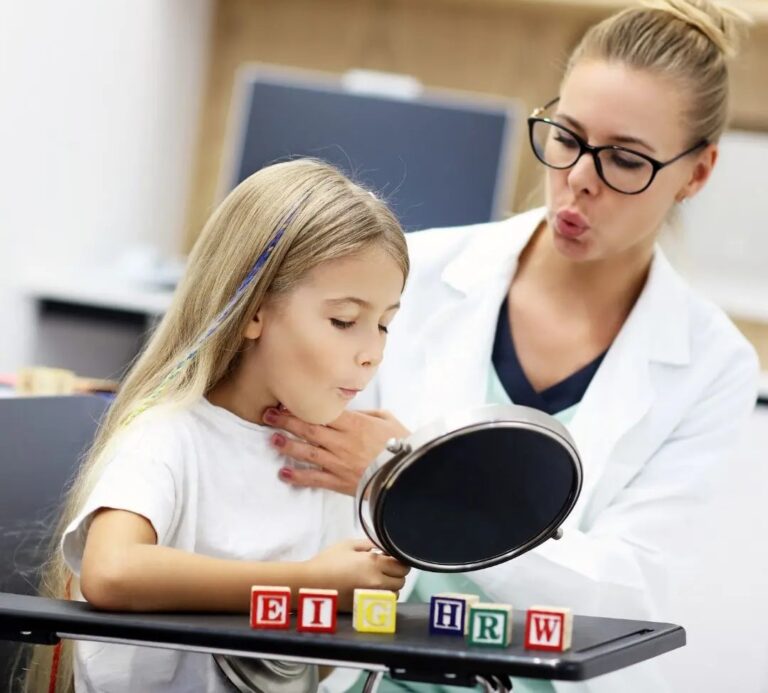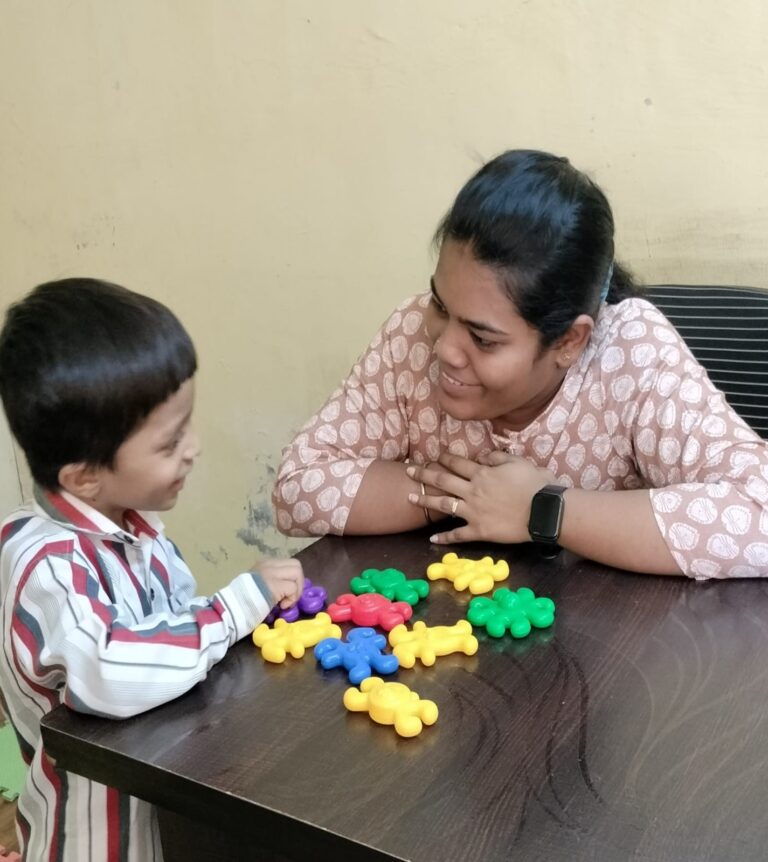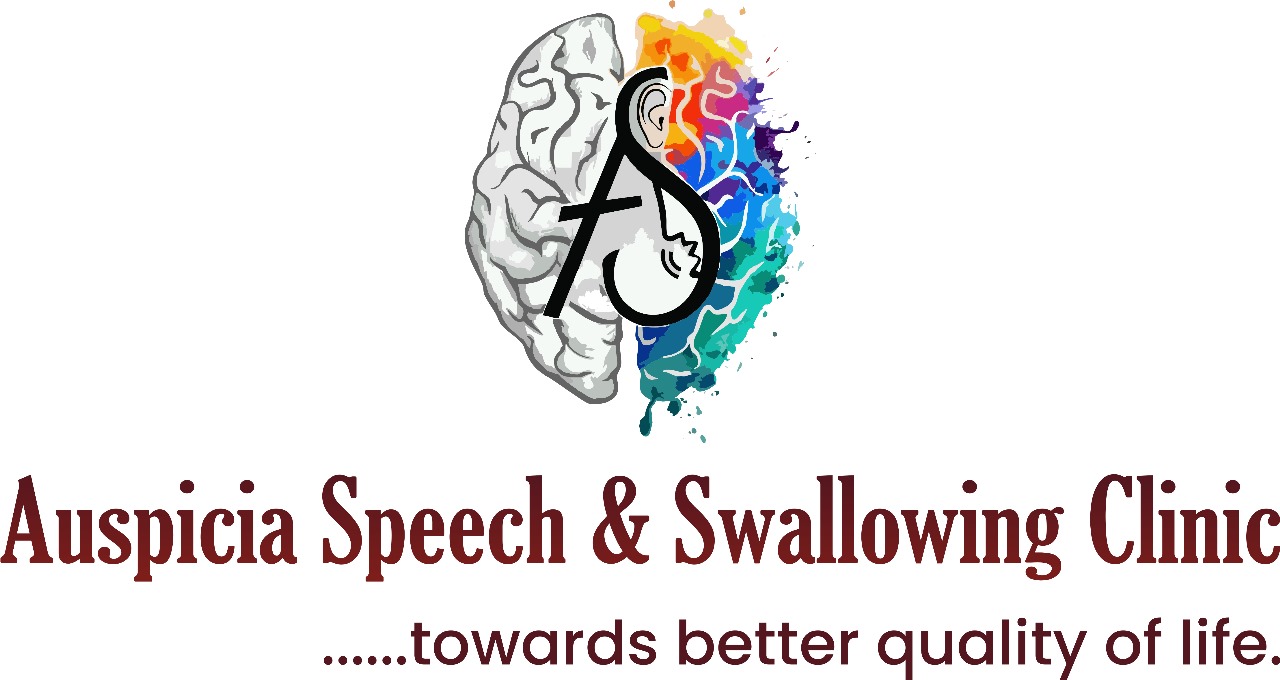Services

Post Stroke and Traumatic brain injury:Neuro Cognitive-communication and swallowing therapy.
Auspicia Speech and Swallowing clinic assess, diagnose, and treat a range of conditions, including those resulting from neurological issues like stroke, traumatic brain injury, or degenerative diseases. Patient might have Neuro Cognitive-Communication and swallowing disorders which includes: Aphasia, Dysarthria, Apraxia, Dysphagia, Parkinson, Dementia, ALS etc.
**NOTE It is very important to start Speech and swallowing therapy as early as possible once the patient is medically stable post stroke and TBI
Don’t wait for 3-4 months or one year after stroke and lose the spontaneous recovery period which is very crucial for recovery.
Spontaneous recovery after a stroke is crucial as it reflects the brain’s ability to heal and adapt where it forms new connections and compensates for damaged areas.
Our clinic offers specialized care to enhance Neuro Cognitive-Communication skills and address swallowing challenges. We combine evidence-based therapies and cutting-edge techniques to create customized treatment plans tailored to your unique needs.
At our clinic, we focus on improving your quality of life and enhancing your communication and swallowing skills. Whether you’re seeking rehabilitation after a stroke, traumatic brain injury, or struggling with voice disorders, we’re here to provide the guidance and support you in your journey to recover.
If you or a loved one are in need of expert speech and swallowing rehabilitation, don’t hesitate to contact us. We’re here to help you find your voice and regain your confidence.

Head and Neck Cancer:Speech and swallowing therapy
Welcome to our Onco-Rehab program with our Deglutology and speech Rehabilitation expert. We understand that the journey through cancer treatment can be challenging, and the impact on your ability to speak and swallow can be significant. Our dedicated team is here to support you every step of the way.
**NOTE: Speech and Swallowing therapy Needs to be Started before Radiation/Surgery and it continues during and post radiation for effective and speedy recovery.
Our comprehensive program is designed to address the individual needs of head and neck cancer patients, focusing on improving speech and swallowing functions. Through a combination of personalized therapy, state-of-the-art techniques, and unwavering support, we aim to help you regain your quality of life. Whether you’re a patient or a caregiver, we are committed to providing you with the tools and knowledge you need to face this challenge with confidence.
Our services:
Evaluation: Assessing the patient’s current speech and swallowing abilities.
Therapy: Providing individualized therapy to improve speech and swallowing function.
Swallowing Exercises: To strengthen swallowing muscles and improve coordination.
Dietary Modifications: Recommending specific food textures and consistencies to make swallowing easier and safer.
Voice therapy: Helping patients regain or improve their voice after surgery or radiation treatment.
Communication Strategies: Teaching alternate means of communication if speech is impaired. Including Tracheostomy care and fitting with speaking if needed. Laryngectomy care: Offering support and training for patients who have had a laryngectomy.
Counseling and support: Providing emotional and psychological support to cope with the challenges of cancer treatment.
Education: Educating patients and their families about the effects of cancer treatment on speech and swallowing.
Follow-up: Monitoring progress and making necessary adjustments to the treatment plan.
Thank you for choosing us to be a team in this journey to better speech and swallowing. Your well-being is our priority, and we look forward to helping you regain the skills and confidence to communicate and eat comfortably once again.

Voice therapy
Welcome to our Voice Rehabilitation Program!
We understand the importance of your voice and its role in your everyday life. Voice disorders can be challenging, affecting not only your ability to communicate effectively but also impacting your confidence and overall well-being. That’s why we’re here to provide comprehensive voice therapy plan tailored to your unique needs.
we are dedicated to regain the confidence to express yourself. Whether you’re a PROFESSIONAL VOICE USERS (Teachers, Singers, Dubbing artists, Actors, purohits, sales person etc) or dealing with hoarseness, Strained or breathy voice, VOCAL CORD PALSY/dysfunction, other voice-related issues like PUBERPHONIA, NODULES, CYST etc. someone looking to communicate better in daily life we are here to support you on your journey to vocal health.
Through our evidence-based and personalized rehabilitation programs, we aim to:
Assess and Diagnose: We begin by thoroughly evaluating your condition to pinpoint the root causes of your voice disorders.
Individualized Treatment Plans: Based on your assessment, we create customized treatment plans to address your specific needs and goals.
Rehabilitation Techniques: Our therapists use a variety of techniques and exercises to strengthen your vocal cords, improve your vocal quality, and enhance your vocal function.
Education and Support: We empower you with knowledge about your condition and offer guidance on how to maintain and protect your vocal health.
Progress Tracking: Throughout your rehabilitation journey, we closely monitor your progress and adjust your treatment plan as needed.
Take the first step towards vocal health by scheduling a consultation with our specialists. We look forward to helping you on your path to improved voice and daily function.

Stuttering therapy
We understand that fluency disorders can impact not only your ability to communicate but also your self-confidence. Our dedicated speech-language pathologists is here to help you or your loved ones regain confidence and fluency in your speech.
Fluency disorders, such as STUTTERING, CLUTTERING can affect people of all ages, from children to adults. They often result in communication challenges that can be emotionally and socially distressing. However, with the right therapy and support, individuals with fluency disorders can make significant improvements in their speech and overall quality of life.
At Auspicia Speech and Swallowing clinic, our approach to therapy is personalized and evidence-based. We work with each individual to assess their specific needs and develop a tailored treatment plan to address their unique challenges. Our team is dedicated to creating a warm and welcoming environment where you can feel at ease while working on your speech fluency.
Stuttering Intervention Protocol
Initial Assessment
- Conduct a comprehensive speech-language assessment to evaluate the nature and severity of the stuttering.
- Gather relevant case history, including onset, duration, and any contributing factors.
Individualized Treatment Plan:
- Develop a personalized treatment plan based on assessment findings and client goals.
- Prioritize evidence-based therapeutic approaches tailored to the unique needs of each individual.
Therapeutic Techniques:
- Implement a combination of fluency-shaping and stuttering modification techniques.
- Utilize strategies such as easy onset, prolonged speech, breathing exercises, visualisation techniques, speech apps and controlled fluency to enhance communication skills.
Counseling and Education:
- Offer counseling to address emotional and psychological aspects of stuttering.
- Educate clients and their families about stuttering, fostering understanding and support.
Parental Involvement:
- Encourage active involvement of parents in the therapeutic process, providing tools to support the client at home.
Progress Monitoring:
- Regularly assess progress through objective measures and client self-report.
- Adjust treatment strategies as needed to ensure optimal outcomes.
Support Groups:
- Facilitate or recommend participation in stuttering support groups to enhance peer support and shared experiences.
Collaboration with Other Professionals:
- Coordinate with relevant healthcare professionals, educators, and employers to ensure holistic support.
Teletherapy Options:
- Provide teletherapy services for clients who may face accessibility challenges or prefer remote sessions.
We are committed to helping you or your loved one achieve improved fluency, increased confidence, and enhanced communication skills. Whether you’re a parent seeking therapy for your child or an adult looking to enhance your fluency, we are here to support you on your journey to fluent and effective communication.
If you have any questions or would like to schedule an appointment, don’t hesitate to contact us. We look forward to helping you achieve fluency and confident communication.

Articulation and phonological Therapy
Welcome to Auspicia Speech and Swallowing Clinic!
We are dedicated to helping individuals of all ages by improving the articulation and phonological skills for effective communication and quality of life through our specialized speech therapy services.
Articulation and Phonological therapy plays a vital role in addressing speech sound disorders that may affect your ability to be understood clearly. Whether you’re a child struggling with speech development or an adult looking to refine your communication skills, our expert speech-language pathologists are here to help you on your journey to improved speech and articulation.
Our individualized therapy programs are tailored to meet your unique needs, ensuring that we address the specific speech sound challenges you or your loved one may be facing. With our comprehensive assessment and evidence-based treatment strategies, we aim to enhance your ability to articulate sounds, syllables, and words with greater precision and clarity.
Our comprehensive evaluation and intervention protoco
Assessment:
- Conduct a thorough speech assessment to identify specific articulation or phonological errors.
- Determine the severity and impact on communication.
Goal Setting:
- Establish clear and measurable goals for improvement based on assessment findings.
- Set both short-term and long-term objectives.
Individualized Treatment Plan:
- Develop a tailored treatment plan addressing the specific needs of the individual.
- Consider the complexity of sounds, syllable shapes, and phonological processes involved.
Articulation Therapy:
- Target specific speech sounds through exercises and drills.
- Use visual aids, models, and tactile feedback to enhance understanding and production.
Phonological Therapy:
- Focus on broader patterns and rules affecting multiple sounds.
- Employ minimal pairs and contrastive therapy to highlight differences between target and error sounds.
Motor Speech Exercises:
- Include exercises to improve overall motor control and coordination for speech production.
- Incorporate oral-motor exercises if appropriate.
Drill Practice:
- Engage in repetitive drills to reinforce correct sound production.
- Gradually increase complexity and context to generalize skills.
Auditory Discrimination Training:
- Enhance the individual’s ability to discriminate between correct and incorrect sounds.
- Use auditory discrimination activities to sharpen phonemic awareness.
Home Practice:
- Provide exercises and activities for home practice to reinforce therapy objectives.
- Encourage consistent practice to facilitate generalization.
Progress Monitoring:
- Regularly assess and monitor progress towards goals.
- Adjust the intervention plan based on progress and any emerging challenges.
Parent/Caregiver Involvement:
- Educate and involve parents or caregivers in the therapy process.
- Provide strategies for supporting speech development at home.
Gradual Fading:
- Gradually reduce support and structure as the individual demonstrates improvement.
- Foster independence in maintaining correct speech patterns.
We believe that effective communication is a fundamental aspect of a fulfilling life. We are committed to providing the highest quality care and support, helping you or your child develop the confidence to express yourself clearly and confidently.
Explore our website to learn more about our Articulation and Phonological therapy services and how we can help you or your loved one achieve improved speech and communication. We look forward to embarking on this transformative journey with you.

Childhood Language and Feeding therapy
Auspicia Speech and Swallowing Clinic believe in Neurodiversity affirming practice. Speech and language therapy is a specialized approach tailored to individuals with diverse neurological conditions, such as AUTISM, ADHD, DYSLEXIA etc. Unlike traditional methods, this practice recognizes and embraces neurological differences, aiming to enhance communication skills, social interaction, and overall quality of life for neurodivergent individuals. We understand that effective communication is fundamental to a child’s development and overall well-being. So we focus on individual strengths and preferences, fostering a supportive environment that respects neurodiversity in language development and communication.
we’re committed to guiding your child toward better communication and a brighter future.
GROUP THERAPY:
Our clinic offers a supportive environment where individuals can enhance their communication skills. we work with a small group of individuals who share similar communication challenges. Sessions focus on improving communication skills through activities, exercises, and discussions tailored to the group’s needs. Group therapy provides a supportive environment, encourages social interaction, and allows participants to practice communication in real-life scenarios. It can be particularly beneficial for individuals with similar speech or language difficulties, fostering a sense of community and shared experiences. Depending on the individuals need we tailor interventions to address specific communication goals within the group context.
FEEDING THERAPY:
Feeding therapy is a specialized intervention aimed at addressing difficulties related to eating, drinking, and swallowing in children which is typically provided by speech-language pathologists.
The process involves:
Assessment: Identifying the specific challenges the individual faces, such as difficulty chewing, swallowing, or aversions to certain textures or tastes.
Goal Setting: Establishing clear, achievable goals for improvement, considering the individual’s age, developmental level, and overall health.
Individualized Plans: Creating tailored strategies to address the identified issues. This may involve sensory exploration, oral motor exercises, Oral placement therapy (OPT) and gradual exposure to various textures and flavors.
Behavioral Approaches: Addressing any behavioral or psychological factors that may contribute to feeding difficulties, such as anxiety or aversions.
Family Involvement: Involving caregivers in the therapy process to ensure consistency and generalization of skills at home.
Sensory Integration: Considering sensory aspects, as some individuals may be sensitive to certain smells, tastes, or textures. Therapy may include activities to desensitize or gradually introduce these elements.
Gradual Exposure: Introducing new foods in a systematic and gradual manner to help individuals become more comfortable with different textures and flavors.
Monitoring Progress: Regularly assessing and adjusting the therapy plan based on the individual’s progress and feedback.
Transition Planning: As clients make progress, we assist in developing transition plans for successful integration of new eating habits into daily life, promoting sustained improvement.
Collaboration: Coordinating with a multidisciplinary team, including physicians, Occupational therapist, dietitians, and other healthcare professionals, to ensure a holistic approach to the individual’s well-being.
Feeding therapy is commonly used for children with developmental delays, sensory processing disorders, or medical conditions affecting oral motor function. It can also be beneficial for adults experiencing difficulties related to stroke, neurological conditions, or other health issues impacting eating and swallowing.
By choosing our feeding therapy program, you are taking a proactive step towards addressing feeding challenges and improving overall quality of life. We are committed to supporting you on this journey to successful and enjoyable mealtimes.

Online consultation and therapy
Online consultation and speech therapy involve virtual sessions with a qualified speech and Swallowing therapist. Through video calls, individuals can receive personalized assessments, exercises, and guidance to improve speech, language, and communication skills. The therapist may address issues such as articulation, fluency, voice modulation, or language development, counselling, parents guidance and tailoring the sessions to the client’s specific needs. These virtual sessions provide a convenient and accessible way to work on speech-related challenges from the comfort of one’s own space.
Book Your Appointment Now !


